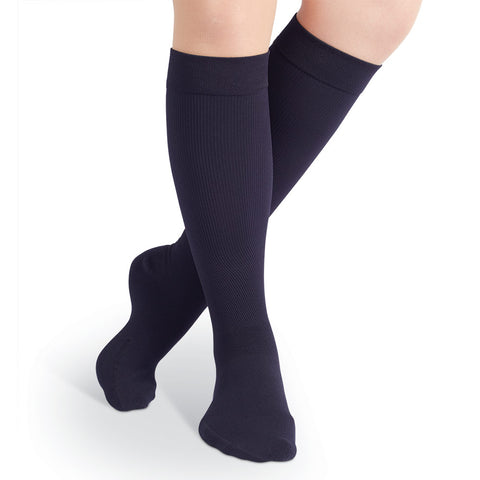Vein issues, particularly in the legs and feet, are very common and impact many individuals. Two conditions, chronic venous insufficiency and peripheral arterial disease (or PAD), affect the veins or arteries in the legs and feet and can have serious symptoms that impact your daily life. Because certain symptoms of diabetes can have adverse effects on the veins and arteries, those with diabetes may be more prone to developing chronic venous insufficiency or PAD. If you are a diabetic with vein problems or one of those conditions, there are steps that you can take to improve your vein health and alleviate your symptoms. The type of socks you wear can actually play a role in managing your symptoms.
What is chronic venous insufficiency and peripheral arterial disease?
Chronic venous insufficiency is a result of improper blood flow from your legs back up to your heart. This occurs when the veins in your legs do not allow blood to flow back to the heart for proper circulation. Tiny valves inside the veins open to help push blood back to the heart. Most of the day, these valves are working against gravity to push the blood in your feet and legs all the way back up to your heart. If the valves become damaged or are not working properly, blood can pool in your feet and legs. This results in poor circulation and can cause swelling, heaviness, fatigue and discomfort in your feet and legs, leg ulcers, varicose veins, and other symptoms. Poor circulation can also lead to other serious health problems.
Peripheral arterial disease (PAD) affects the arteries, which help pump blood from your heart throughout your body, specifically in your arms and legs. PAD occurs when the arteries become too narrow to carry enough blood to your arms and legs, usually from a build-up of fat or other substances that clog the arteries. This condition is more common in the legs. Symptoms of PAD include cold feeling, numbness or weakness, cramping and discomfort.
As a diabetic, you most likely already practice proper foot care by wearing the right type of socks and keeping your feet clean. If you are a diabetic that also has venous insufficiency or PAD, your symptoms may be heightened. Because they are closely related, many symptoms of diabetes can worsen symptoms of chronic venous insufficiency or PAD, and vice versa. The use of compression socks may help relieve symptoms and improve your leg and vein health. Compression socks improve circulation by applying graduated compression to help push blood back up to the heart. Improved circulation helps prevent and relieve heaviness, swelling, discomfort and fatigue in your feet and legs. It can also help with many other common symptoms of venous insufficiency or PAD.
In a clinical study1, the use of mediven angio diabetic compression socks was studied in patients with diabetes mellitus and chronic venous insufficiency or peripheral arterial disease. For these patients, testing the ABPI (Ankle Brachial Pressure Index) is crucial. The ABPI score indicates whether or not compression is safe for use. only patients within a certain ABPI score were eligible to wear compression and participate in the study. As a result of the study, mediven angio diabetic compression socks were proven safe to use for specific individuals with diabetes and venous insufficiency or PAD symptoms. These socks helped improve circulation and helped relieve certain diabetic and vein symptoms. Patients also rated the wearing comfort of the socks from very good to good.
Mediven angio was designed to offer safety in treatment for venous disease and peripheral arterial disease symptoms in diabetics. The socks include Merino Plush in the entire foot for both comfort and protection. Unique padding throughout the foot and ankle reduces pressure and irritation on bony areas and prevents skin breakdown and lesions. They also include an extra long flat toe seams that reduces pressure points on the toes and feet for a more comfortable fit.
You should always consult your doctor first before wearing compression to make sure it is the right choice for you and your symptoms. If you have diabetes, chronic venous insufficiency or PAD, talk to your doctor about your symptoms to see if compression is safe for you.
-------------
References:
1. Rother U et al. Safety of medical compression stockings in patients with diabetes mellitus or peripheral arterial disease. BMJ Open Diab Res Care 2020;8e:001316. https://tinyurl.com/3cjmcr7k



